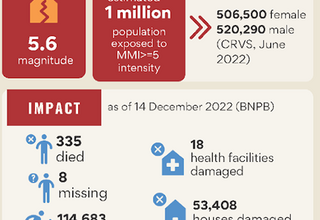Located along the Pacific “Ring of Fire”, Indonesia is prone to natural and man-made disasters. In humanitarian settings, measures are required to:
- Ensure safe pregnancies and childbirth
- Prevent and respond to Gender-Based Violence (GBV) including sexual violence
- prevent Human Immunodeficiency Virus (HIV) transmission
- prevent unwanted pregnancy, due to disruption of family planning services.
UNFPA Indonesia continues to support the ongoing operationalization of the Minimum Initial Service Package (MISP) for Reproductive Health in humanitarian settings, including for young people; the implementation of GBV prevention and response in humanitarian settings; and the strengthening of the use population data for disaster preparedness management.
-
Minimum Initial Service Package (MISP)
UNFPA continues its support for the MISP implementation in Indonesia that covers the needs of young people and involves them in disaster response. The MISP programme covers the prevention of excess maternal and neonatal morbidity and mortality, prevention of sexual violence, prevention of HIV transmission and prevention of unintended pregnancies. In addition; different types of hygiene kits for women of reproductive age, pregnant women, post-delivery women and the newborn are procured by UNFPA and stockpiled to maintain the hygiene and dignity of women affected by disasters.
-
GBV prevention and response
UNFPA supports implementation of the GBV prevention and response programme in humanitarian settings including the Women Friendly Spaces (WFS) intervention, the strengthening of coordination and the availability of national guidelines.
-
The use of population data for disaster management
UNFPA continues to support availability and use of population data for disaster management through innovative data collection and sharing; availability of baseline population data, the national guidelines on the use of population data for disaster management, and the mobile application for data collection in preparedness and acute response.


